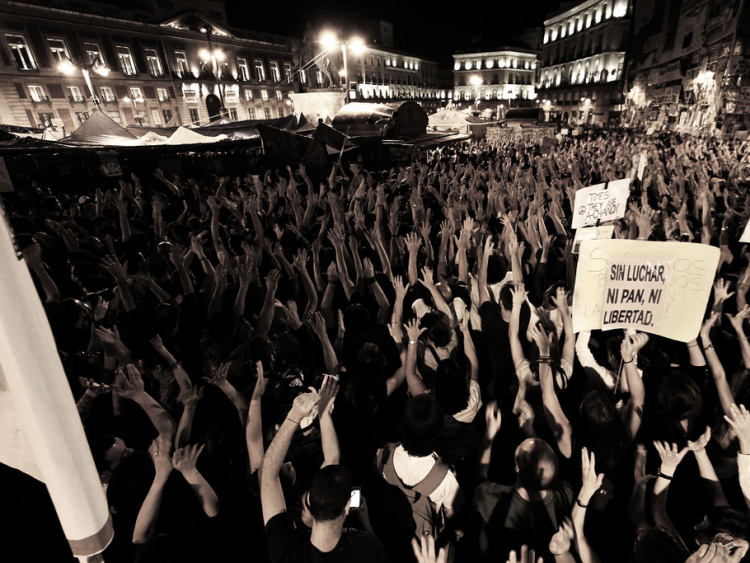
There are a thousand ways to reach this semicircular plaza, iconic space in Madrid for their features like Kilometer 0 or celebrating the new year. The various metro and 10 streets leading to it extol its centrality. This interest was what made from May 15 to June 12 found the square packed with people protesting against the current "democratic" system. At first, they were a few who occupied the square with a spontaneous camping, but because of police charges (or perhaps because of them) many citizens of Madrid joined the cause. This resulted in what might be called a civic Guggenheim effect because all cities in Spain began to have his own camp, from big cities like Barcelona to the smallest as Donostia-San Sebastián.
You could leave one of many stops having Sol station or download from Gran Vía from the street price, and at the bottom of all saw as the crowd was in full swing by the new social space that had been created ( Yes, I created) thanks to the thousands of citizens who made the Plaza del Sol your home and work. Before reaching the square, it was possible to glimpse a large tents with large lights that could be raised and lowered with astonishing rapidity, depending on weather conditions at the time. And from this distant image with the crowd in the background, you could begin to imagine what it was all about.
There was a complex inner structure composed of all functional platforms that were juxtaposed along the entire square. They had a variety of activities that could function to inform, coordinate, or even entertain and live. We could consider it as a public space become a micro-city organized. A square by and for the people. And the most interesting thing is that out of motivation and effort of everyone who wanted to collaborate. A great example of citizen participation and social commitment emerging from the outrage and disagreement with the current situation. A joint complaint on the economic and political decline that was demonstrated by examples such as the use of public money to cover errors banks, massaged reforms that contradicted social welfare, the worrying number of unemployed or budget cuts for health and education.
The organization of this structure, crossed by some dirty media and uncoordinated, showed the opposite. Different "streets" and "plazas" connecting the different spaces built with mostly recycled and lightweight materials. Clever uses of reusable materials. From strings to canvas creating different key points for the coordination of all the campsites. "Information" guided one who brought food to come closer to one of three positions "Power". While they could leave their children in the playground. Some wondered "Economy", others "Environment". Those who had some free time cleaning up after being passed by the library to read a little. College students who were in the home stretch but still found time to participate, could work in the study area, next to the infirmary. The new public space covered everything that might exist, which had created a need and request of the members. Perhaps most important of all this, was flexibility. All allowed a constant reorganization based on momentary needs thanks to the dynamism and a surprising resilience. If it had not happened, It would seem utopian, right?
Public Space jury has awarded the prize "special category" (specifically created for this edition of 2012) to the camp. What happened in the square became an example of citizen action. A collective thinking was reflected in the creation of a public space that despite being ephemeral, was exemplary. Camping Sol helped us become aware of the status of human beings and their need for freedom. In short, a public space since its inception has been the scene of action and political events generated in community, in order to improve the "City".
Featured Image by Daniel Dionne






